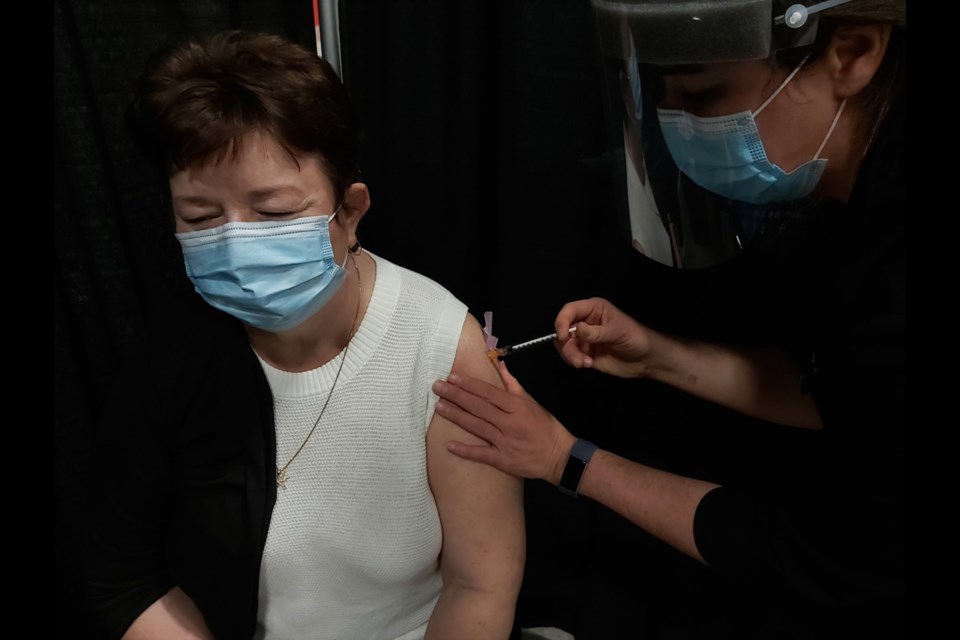Batchewana First Nation elders, registered to take the COVID-19 vaccine, gathered at the community’s Rankin Arena Thursday, the doses administered by Batchewana First Nation Health Centre nurses.
The clinic, offering doses of the Pfizer vaccine, ran from 9 a.m. to 3 p.m., with another clinic scheduled for next Thursday.
Clinics are being held weekly, but that could change if vaccination deliveries ramp up.
Those interested in taking the vaccine (elders first, then younger individuals) must first register with the Batchewana First Nation Health Centre.
Delivery of the vaccine arrived at Batchewana First Nation approximately two weeks ago, first and second doses having already been administered at the community’s 10-unit Elders Complex and to other elders within the Home and Community Care program.
Thursday’s clinic at Rankin Arena, however, marked the first major rollout of the vaccine in the community, for elders 55 years of age and older.
“There’s some special accommodation for elders. Our life expectancy isn’t as high as the mainstream so they've accommodated that with the age being 55. We do have a lot more pre-existing medical conditions and we have a lot of chronic illness in our communities,” said Dean Sayers, Batchewana First Nation chief, speaking to SooToday.
1,056 doses have been ordered for delivery for elders opting to receive the vaccine, Sayers said.
“It’s coming in in batches so we anticipate within the next few weeks that'll be complete for the elders but by the end of March all of our citizens 18 and over will have been vaccinated.”
Communication is vital in the vaccination campaign, Sayers said, noting some additional federal funding has been put into getting the message out to everyone in the community about the availability of the vaccine.
“We need people to call us, to contact us and confirm their interest in the vaccine so we can get some information from them so we hope they can contact us sooner rather than later and speak to our community health nurses for the final permission for the actual vaccine. There’s a little bit of a process but we have people to help walk them through that process,” Sayers said.
“Some of our elders aren’t able to get around and have that kind of transportation, so our health team has been really awesome in making sure that they still receive that vaccine,” said Alex Syrette, Batchewana First Nation communications manager.
Batchewana healthcare professionals are administering the vaccine to the three communities within Batchewana First Nation, namely Batchewana Village, Rankin and Goulais Mission.
“Of course we are conscious that people can and will make up their own minds if they wish to take advantage of the vaccine. The majority of our community is taking advantage of it. It’s up in the mid-70s percentage of people who are actually wanting to have the vaccine. It’s coming along well,” Sayers said.
“The accommodations (for BFN elders 55 and over) are good to see. We have regular tables that meet regularly (weekly) with the Crown, First Nations chiefs and the provincial representatives where we talk about the challenges with COVID and how we can remedy those. Things like being a priority doesn’t come just naturally. It takes lobbying, discussions and an open table, open minds to have that happen and we have had that with Canada and Ontario.”
As reported earlier, there is some mistrust within Indigenous communities towards the federal and provincial health systems, based on discrimination and a history in which Indigenous people were test subjects for medical treatments.
“There are generally trust issues, with the history of the Crown, many institutions, residential schools, legal systems, education systems, health systems, there are all kinds of issues that have happened to our people over the years and it’s not always a nice story to tell, so we find there is some reluctance, some trust issues, but what we’re trying to do is make sure everybody has information to make an educated, informed decision on whether or not they actually take advantage of the vaccine being available,” Sayers said.
“We’re there to answer any questions people may have about the vaccine. A lot of our elders are taking the vaccine. I’m not really familiar with anybody right now who is saying ‘no, I’m not taking it.’ We encourage people to look for the really valid, fact-based information in making their decisions.”
“We also want to mention to people that just because you have the vaccine doesn’t mean that you may not be a carrier. You may be asymptomatic, so we encourage people, if they do get the vaccine, to continue to maintain their social distancing, wear their masks, continue hand washing and only go out if they need to. We want to make sure the rest of our community is safe,” Sayers said.



